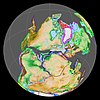Marichuela Formation
The Marichuela Formation (Spanish: Formación Marichuela, N1m) is a geological formation of the Bogotá savanna, Altiplano Cundiboyacense, Eastern Ranges of the Colombian Andes. The formation consists of coarse to very coarse conglomerates. The Marichuela Formation dates to the Neogene period; Late Miocene to Early Pliocene epochs, and has a maximum thickness of 40 metres (130 ft).
Etymology
The formation was defined by Helmens and Van der Hammen in 1995 and named after the Marichuela neighbourhood of Usme. Part of the Marichuela Formation had been included in the Conos de Tunjuelo, defined by Julivert in 1961.
Description
Lithologies
The Marichuela Formation consists of coarse to very coarse conglomerates.
Stratigraphy and depositional environment
The Marichuela Formation unconformably overlies the Cretaceous rocks of the Guadalupe Group. The age has been estimated to be Late Miocene to Early Pliocene. The depositional environment has been interpreted as alluvial fans, caused by earthquakes or heavy rains.
Outcrops
The Marichuela Formation is apart from its type locality in the Usme Synclinal, the valley of the Tunjuelo River, found in the synclinals of Neusa, Sisga and La Calera.
Regional correlations
- Legend
- group
- important formation
- fossiliferous formation
- minor formation
- (age in Ma)
- proximal Llanos (Medina)
- distal Llanos (Saltarin 1A well)
See also
Notes
References
- ^ Montoya & Reyes, 2005, p.65
- ^ Suna Hisca, s.a., p.45
- ^ Montoya & Reyes, 2005, p.67
- ^ Montoya & Reyes, 2005, p.66
- ^ García González et al., 2009, p.27
- ^ García González et al., 2009, p.50
- ^ García González et al., 2009, p.85
- ^ Barrero et al., 2007, p.60
- ^ Barrero et al., 2007, p.58
- ^ Plancha 111, 2001, p.29
- ^ Plancha 177, 2015, p.39
- ^ Plancha 111, 2001, p.26
- ^ Plancha 111, 2001, p.24
- ^ Plancha 111, 2001, p.23
- ^ Pulido & Gómez, 2001, p.32
- ^ Pulido & Gómez, 2001, p.30
- ^ Pulido & Gómez, 2001, pp.21-26
- ^ Pulido & Gómez, 2001, p.28
- ^ Correa Martínez et al., 2019, p.49
- ^ Plancha 303, 2002, p.27
- ^ Terraza et al., 2008, p.22
- ^ Plancha 229, 2015, pp.46-55
- ^ Plancha 303, 2002, p.26
- ^ Moreno Sánchez et al., 2009, p.53
- ^ Mantilla Figueroa et al., 2015, p.43
- ^ Manosalva Sánchez et al., 2017, p.84
- ^ Plancha 303, 2002, p.24
- ^ Mantilla Figueroa et al., 2015, p.42
- ^ Arango Mejía et al., 2012, p.25
- ^ Plancha 350, 2011, p.49
- ^ Pulido & Gómez, 2001, pp.17-21
- ^ Plancha 111, 2001, p.13
- ^ Plancha 303, 2002, p.23
- ^ Plancha 348, 2015, p.38
- ^ Planchas 367-414, 2003, p.35
- ^ Toro Toro et al., 2014, p.22
- ^ Plancha 303, 2002, p.21
- ^ Bonilla et al., 2016, p.19
- ^ Gómez Tapias et al., 2015, p.209
- ^ Bonilla et al., 2016, p.22
- ^ Duarte et al., 2019
- ^ García González et al., 2009
- ^ Pulido & Gómez, 2001
- ^ García González et al., 2009, p.60
Bibliography
- Montoya Arenas, Diana María; Reyes Torres, Germán Alfonso (2005), Geología de la Sabana de Bogotá, INGEOMINAS, pp. 1–104
- N., N, Parque Ecológico Distrital de Montaña Entrenubes – Tomo I – Componente Biofísico – Geología, Corporación Suna Hisca, pp. 36–51
Maps
- Buitrago, José Alberto; Terraza M., Roberto; Etayo, Fernando (1998), Plancha 228 - Santafé de Bogotá Noreste - 1:100,000, INGEOMINAS, p. 1, retrieved 2017-06-06
External links
- Gómez, J.; Montes, N.E.; Nivia, Á.; Diederix, H. (2015), Plancha 5-09 del Atlas Geológico de Colombia 2015 – escala 1:500,000, Servicio Geológico Colombiano, p. 1, retrieved 2017-03-16
























